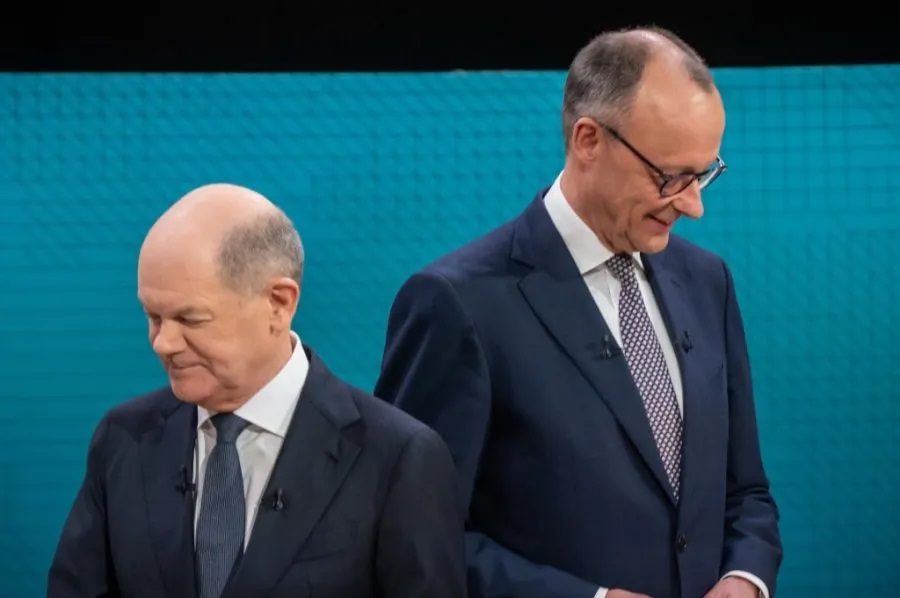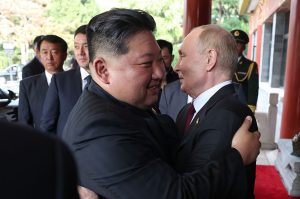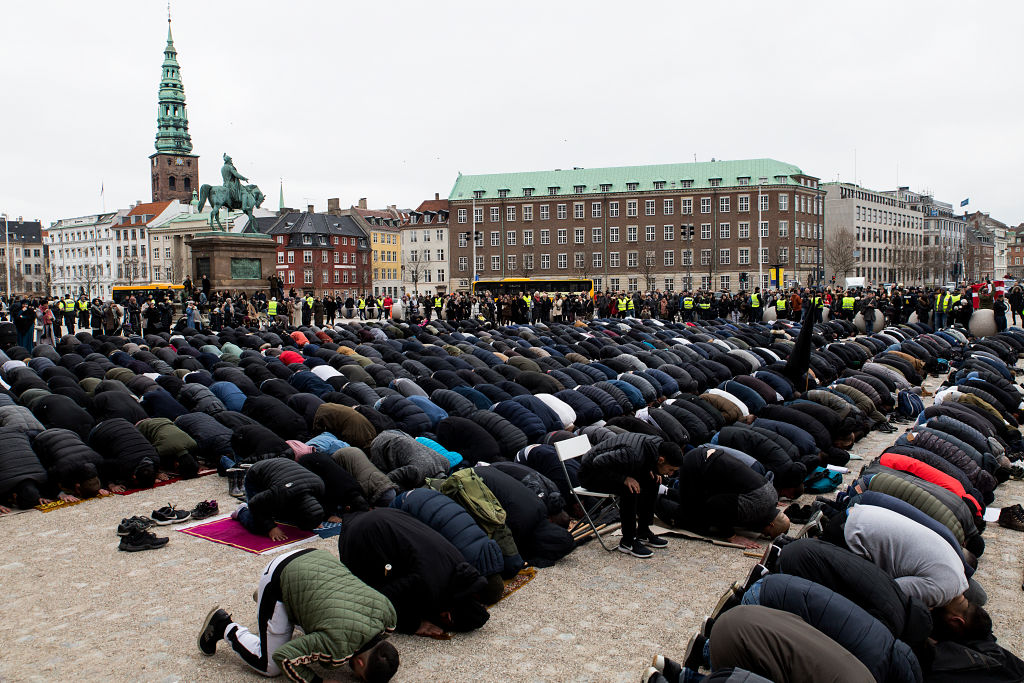When European leaders discussed their response to US-Russian negotiations about ending the war in Ukraine, the German chancellor Olaf Scholz felt “a little irritated.” France and Britain suggested sending European troops to secure a peace deal. Days away from an election likely to boot him out of power, Scholz found this an “inappropriate debate at the wrong time.” It will likely fall to his successor to shoulder Germany’s fair share of responsibility for European security.
US and Russian officials have today held the first of peace talks in Saudi Arabia, forcing European countries to determine their role as a matter of urgency. British prime minister Keir Starmer said “European nations must step up” which also means being ready to send British troops if necessary. France suggested assembling a “reassurance” force of up to 30,000 troops behind a future peace line in Ukraine to which it would contribute up to 10,000 men and women. European leaders are hoping that showing commitment will secure a US “backstop” to such an arrangement.
The speed of Trump’s push for a peace deal will require a clear stance from Germany very soon
Scholz left the meeting visibly annoyed, telling reporters that such debates were “premature” and “highly inappropriate.” He knows he is not in a position to promise anything. Polls suggest that the German elections this Sunday might put his party in third place with as little as 15 percent of the vote. But even if he won unexpectedly, Scholz’s strategy would be to borrow more money to give to Ukraine. He has previously ruled out sending German troops.
When Scholz delivered his much-applauded “Zeitenwende” speech three years ago, he promised that Russia’s brutal violation of European borders constituted nothing less than a “turning point” for Germany. A special fund of $100 billion was made available to boost the country’s depleted military, and Berlin pledged to spend over 2 percent of its GDP on defense annually. Deterring “warmongers like Putin,” Scholz declared, “requires strength.”
It seemed for one moment that Germany’s new leader understood the principle of deterrence: to be both ready and willing to fight if necessary. But while Germany is indeed spending a lot of money on reviving its dilapidated Bundeswehr and has become Ukraine’s second-largest aid provider, Scholz has never put credible conviction behind the idea that his country stands ready to defend Europe from Russian aggression.
The Zeitendwende has been largely about money, not a genuine change in attitude. Scholz recently blocked a $3 billion boost to military aid for Ukraine proposed by the foreign ministry. Such moves are part of his cultivated image of “Besonnenheit” — “prudence,” which in practice translates into drip-feeding aid (albeit significant amounts) into Ukraine while knowingly giving the impression that Germany would never go beyond that.
Under a “prudent” Scholz, Germany can’t build credible deterrence to back a future peace deal in Ukraine. But Friedrich Merz, the man likely to succeed him, has a chance to rebuild Germany’s role in European defense. It was his conservative CDU/CSU that rebuilt the (West) German military after World War Two as the front line of NATO’s deterrence against the Soviet Union.
For much of the Cold War, West Germany spent between 3 and 5 percent of its GDP on defense, successfully contributing to keeping the peace for decades of high tension. Successive chancellors, including from Olaf Scholz’s SPD, realized that protecting their populations was more important than pandering to platonic ideals of pacifism that are latent in German society due to the guilt and trauma of two world wars.
Merz holds his cards close to his chest on defense. He has said he wants to ensure that Germany can spend 2 percent of GDP on it long-term and then look at whether this can be boosted further. At the Munich Security Conference this weekend, he also said, “I fully agree with all those who are demanding more leadership from Germany.”
Whether this means that he would be willing to commit German troops to a peacekeeping force in Ukraine remains to be seen. When the Green foreign minister Annalena Baerbock suggested this in December, his response was to criticize her as “irresponsible” because “nobody was asking this question at the moment.” But now people are asking the question.
Merz has avoided making Ukraine a major campaign topic, but the speed of Trump’s push for a peace deal will require a clear stance from Germany very soon. The conservative leader may be concerned about driving more voters to the Alternative für Deutschland (AfD), which currently polls in second place and prefers a lenient approach towards Russia with which it wants to restore “undisturbed trade.”
There would certainly be vocal opposition to German boots standing ready against Russian soldiers on Ukrainian soil. Historical alarm bells would ring loud in German ears and trigger demonstrations. But that happened during the Cold War, too. When one of Scholz’s SPD predecessors, Helmut Schmidt, allowed more American nuclear weapons to be stationed in Germany in 1979, this triggered huge peace protests for years. One of the largest in the country’s history happened when hundreds of thousands took to the streets in 1983 — a time, by the way, when a young Olaf Scholz wrote essays about what he saw as an “aggressive-imperialist NATO strategy.”
No German chancellor would have an easy time dragging the country out of its comforting conviction that it would never have to be war-ready again. But it is possible for Merz if he shows leadership. Half of Germans said in a poll that they would be in favor of Bundeswehr contributions to a peace force in Ukraine. That’s almost the same as the proportion of people in the UK according to a recent survey.
Merz will likely end up in a coalition with either the Greens or the SPD, possibly both. The Greens have been the most hawkish on defense. Their chancellor candidate Robert Habeck has suggested boosting spending to 3.5 percent of GDP. In the SPD, Scholz might well step down in favor of his current defense minister Boris Pistorius, who didn’t rule out Bundeswehr troops in Ukraine when asked in December. So, there is political headroom for Merz on this issue.
Germany’s next chancellor has a real opportunity to do what Scholz promised and never delivered: to create a strong, fighting-fit Germany in the center of Europe that is able to help deter Russian aggression. Whether the untested Friedrich Merz will show more conviction and determination than his predecessor remains to be seen.


























Leave a Reply